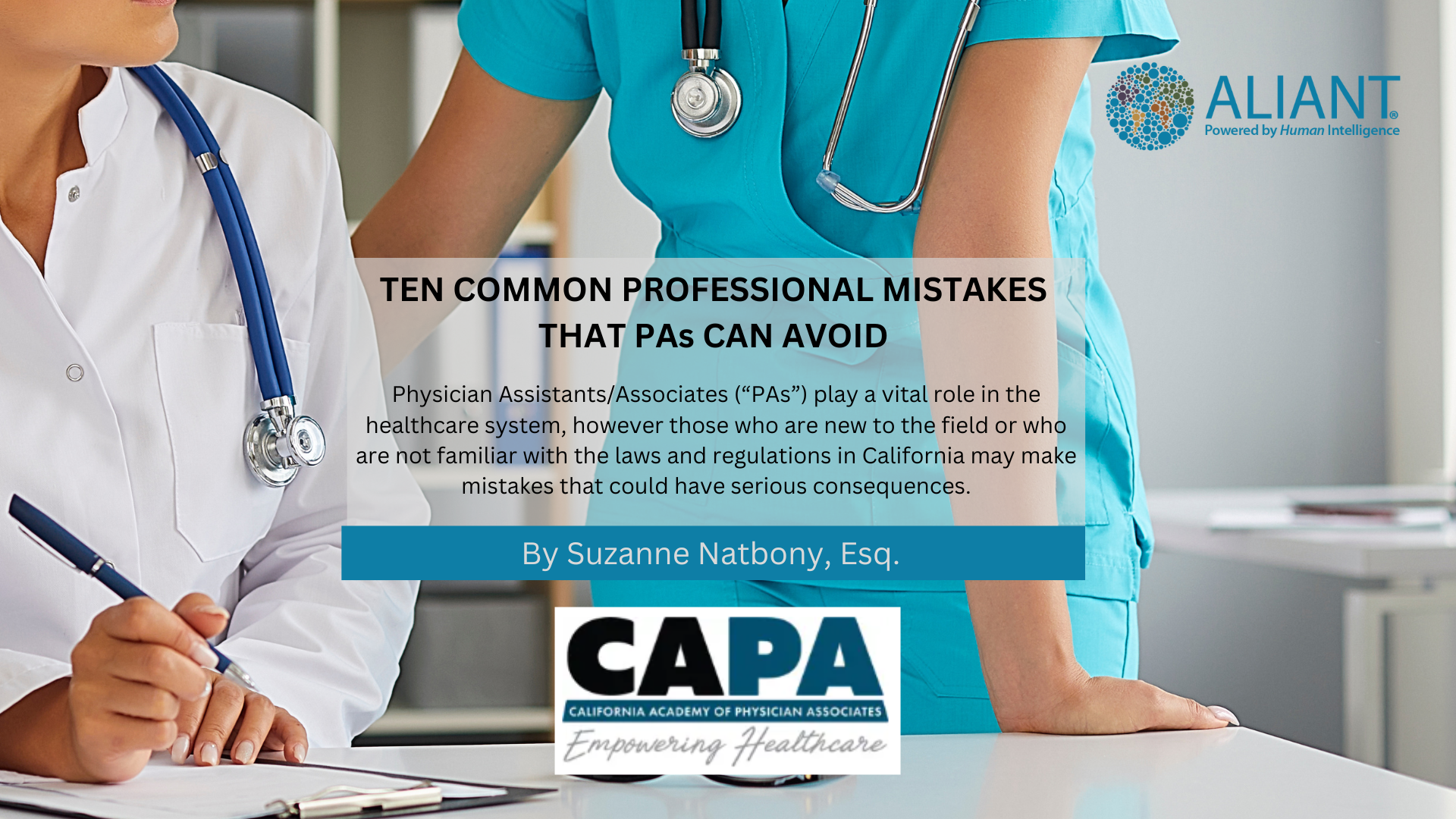Physician Assistants/Associates (“PAs”) play a vital role in the healthcare system, providing high-quality care to patients under the supervision of physicians. However, PAs who are new to the field or who are not familiar with the laws and regulations in California may make mistakes that could have serious consequences.
Here are some common mistakes that PAs in California should avoid:
1. Failing to have an attorney review a potential job offer or employment agreement. Medical practices may attempt to misclassify PAs as exempt, when they should be non-exempt. Further, employers may try to insert invalid clauses, such as non-competes or liquidated damages,which should be reviewed by a PA’s lawyer.
2. Not having a practice agreement in place with a physician. PAs in California are required to have a written practice agreement with a physician in order to practice medicine. This agreement outlines the PA’s scope of practice, responsibilities, and duties. It also specifies the physician’s supervision requirements. Without a practice agreement, a PA could be held liable for any mistakes they make, even if they were acting under the supervision of a physician.
3. Not having malpractice insurance. Malpractice insurance is recommended for PAs in California. It provides financial protection in the event that a PA is sued for malpractice. Malpractice insurance can be expensive, but it is a small price to pay for the peace of mind and asset protection that it provides.
4. Engaging in false advertising. PAs in California are prohibited from engaging in false or misleading advertising.This includes advertising that implies that a PA is a physician, or that a PA can provide services that are outside of their scope of practice. PAs who engage in false advertising could face disciplinary action from the Physician Assistant Board (PAB).
5. Not keeping up with continuing education requirements. PAs in California are required to complete a certain number of hours of continuing education each year in order to maintain their license. Continuing education helps PAs to stay up-to-date on the latest medical knowledge and techniques. PAs who do not complete their continuing education requirements could have their license suspended or revoked.
6. Not being a part of a professional organization, or community or “brain trust.” Being a member of a professional organization such as the California Academy of Physician Associates (CAPA) offers a variety of resources to help PAs stay up-to-date on the latest medical knowledge and trends.
7. Not having a mentor. A seasoned PA can offer guidance and support, and help to avoid making common mistakes.
8. Failing to report when mandatory. PAs in California are required to report certain litigation and dispute outcomes over $30,000, along with other situations in certain settings, including adverse events in outpatient surgery settings, and criminal actions.
9. Not being honest or having patients’ best interest in mind. When a PA treats a patient and fails to disclose risks or alternative treatments, the PA may risk failing to give the patient informed consent. Further, being able to
demonstrate that a PA has the patient’s best interest in mind, rather than financial gain provides great legal protection.
10. Failing to handle patient complaints and disputes in an amicable manner. PAs need to be able to set their ego aside, and listen to patient complaints, in a calm and professional manner. Good bedside manners are the number
one way to prevent lawsuits. Keep up the good manners when dealing with patient complaints to seek resolution.
By avoiding these common mistakes, PAs in California can protect themselves and their patients. If you are a PA in California, be sure to familiarize yourself with the laws and regulations that govern your practice. You can find more information on the California PAB or CAPA website. Suzanne Natbony is a licensed California lawyer, with an emphasis in healthcare law, and partner at Aliant LLP, practicing transactional and regulatory-compliance law, while also being an entrepreneur with her own healthcare product company. She is also general counsel to a multistate medical spa franchise and other medical spas and physicians around the U.S. You may contact Suzanne by email at suzanne@lawyer.com
FOLLOW US ON LINKEDIN
SEE MORE ALIANT INSIGHTS



